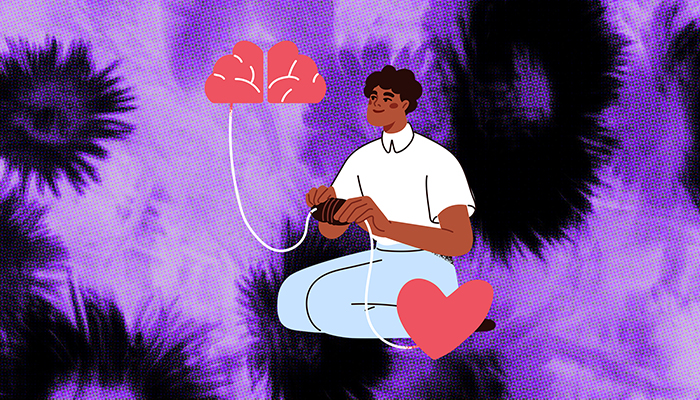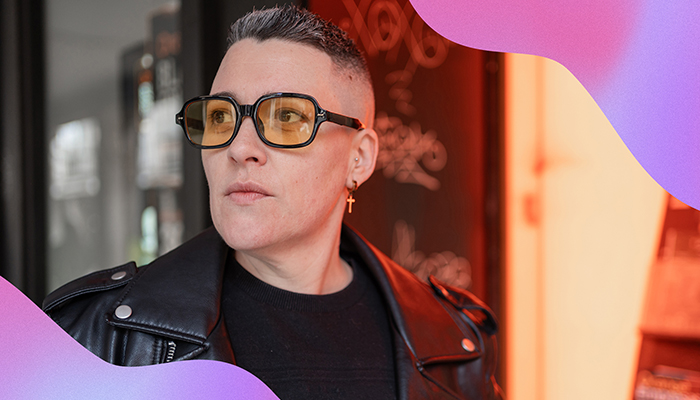Illustrations by Leo Mateus. This article was written for FOLX by Dr. Sand Chang, PhD (they/them), a Chinese American nonbinary psychologist and trainer.
It can be hard, at times impossible, to separate out the different pressures we face living day to day in our trans and non-binary bodies. When it comes to existing in relative comfort, it’s not just about aesthetics. It’s about safety, access, all the things we are not talking about. And we need to talk about eating disorders in the trans community because they are killing us.
What is the prevalence of eating disorders in trans and/or non-binary communities?
Trans people are at a much higher risk of developing eating disorders, yet are more likely to be under diagnosed because we don’t fit the mold of the eating disorders stereotype: white, cis, heterosexual women. In fact, one survey study (Diemer et al., 2015) suggests that trans people are over eight times more likely to have been diagnosed with an eating disorder in the past year. That figure is likely an underestimate, as the criteria for being diagnosed with eating disorders is extremely limited. Eating disorders affect people of all genders: trans masculine folks, trans feminine folks, non-binary folks...basically anyone who has a body under surveillance.
What factors lead to having a disordered relationship to food or your body shape, size, or weight?
The relationship between disordered eating and being in a gender non-conforming body looks different for everyone and depends on multiple factors. How you feel about your body, shape, and size are often related to your family, race and ethnicity, cultural background, and of course, the anti-fat bias that we are all exposed to regardless of where or how you grew up.
There are lots of reasons why trans and non-binary people develop negative or compromised relationships with our bodies. These are often related and entangled with gender dysphoria, anti-fat bias, and transphobia. Some feel pressure to live up to masculine or feminine ideals based on cis-centric western binary conceptions of beauty or desirability. Others may fear how they are perceived and how this will affect their safety as they move through the world. Furthermore, due to the exclusive and discriminatory healthcare systems, many people don’t have options for medicalized forms of transition. When barred from access to hormones and/or gender-affirming surgeries, many trans folks might look for ways of trying to manage their body size, shape, or weight. Unfortunately, these coping methods are not effective long-term strategies.
What are examples of disordered eating among trans and non-binary communities?

Disordered eating can look like one or more of the following:
- intentionally restricting one’s food intake
- following strict rules about food, eating, or exercise
- binge eating or eating a large amount of food that results in a great deal of discomfort, guilt, or a perception of being out of control
- various strategies to “undo” the amount of food that was eaten (e.g., exercise, vomiting, laxative use)
- compulsive exercise
- negative body image or distress about one’s body size, shape, or weight, and more
Eating disorders look different on different people. There are many ways that trans people can develop disordered eating and related behaviors—some overt and others more subtle. Some people engage in food restriction or compulsive exercise in order to manage their weight, shape, or size, which is commonly linked to wanting one’s body to be perceived more in line with white and cis-heteronormative ideals for masculinity and femininity. However, these aren't the only pressures that lead to unhealthy relationships with our bodies.
Food insecurity (lack of consistent access to food) contributes in a major way to disordered eating. Not having enough food or being able to predict when you are going to eat can create a huge disconnect between our sense of appetite/hunger and our bodies. This plays into the binge-restrict cycle, which is often depicted by a swinging pendulum in which a person might restrict food, feel deprived, and then engage in binge-eating. Often, these people feel so guilty about eating “too much” when in fact the real culprit is restriction or dieting. The fear of discrimination when seeking public assistance is an additional barrier to food access for trans and non-binary people. There is also what is referred to as minority stress experienced by trans and gender-nonconforming people, one type of which is "expected rejection," which can lead to a greater need to find ways to just cope with everyday life, including binge eating, food restriction, compulsive exercise, and other disordered eating behaviors.
What happens when we add hormones to the mix?

Being able to access hormones is a life-changing thing for many people, but sometimes HRT can affect weight and thus how someone feels about their body in a diet-centered and fatphobic culture. While hormones can help certain aspects of gender affirmation (decreased dysphoria), they can also increase a different kind of dysphoria about one’s size. Many people are worried about the weight they might gain if they go on hormones. Some people lose weight as a result of taking hormones. This is especially true for those who already had disordered eating prior to starting hormone therapy. Of course, there is no way to guarantee that one's body won’t put on weight as a result of hormones or other factors. HRT can be complex in this way, as hormones can both reduce and increase dysphoria at the same time.
It’s important to hold the complexity of all of this. Yes, body fat distribution (see more on expected changes with testosterone here or estrogen here) can be an important part of gender affirmation. When our body shape doesn’t feel right for our gender, that often doesn’t feel good. And yet, we need to continually dig deeper and also ask ourselves to interrogate the fatphobia or binary conceptions of gender we have internalized. There is no easy answer that fits all of us.
How do I know if I’m engaging in disordered eating? What do I do if I’m struggling with disordered eating?
A lot of people who have disordered eating don’t know because the stereotypes and diagnoses for eating disorders are so limited. That means that a lot of people who are struggling don’t know that they need or deserve help. If you spend a significant amount of time focused on food, exercise, or your body, if your relationship with food feels stressful, or if you turn to food or exercise to cope in ways that create even more problems or distress, you might be struggling with disordered eating. If so, it’s important that you find others who might have similar experiences. It can be helpful to reach out to professionals who are both trans-knowledgeable and understand eating disorders. Many mainstream medical systems can have a lot of anti-fat bias, so it can be helpful to find practitioners who have an anti-diet, fat-positive, weight-neutral approach (e.g., Health At Every Size, Body Trust). And, because none of us need more pressure to get things “right”, look for someone who can have a conversation about harm reduction, someone who understands that it’s not as easy as just stopping something that might actually be helping you or keeping you safe.
Some Instagram accounts to follow on the intersection of eating disorders/recovery, fat liberation, and/or queer/trans-identity:
- FEDUP Collective @fedupcollective
- Sam Dylan Finch @samdylanfinch
- Ilya Parker @decolonizing_fitness
- Caleb Luna @chairbreaker
- Sonalee Rashatwar @thefatsextherapist
- Syd Yang / Blue Jaguar @bluejaguarlove
- thirdwheelED @thirdwheeled
- Virgie Tovar @virgietovar
__
FOLX Health is the first digital healthcare company designed by and for the LGBTQIA+ community. Our services include virtual primary care, gender-affirming hormone therapy including estrogen and testosterone (HRT), mental health care, sexual and reproductive health care, preventive care, and fertility consultations. FOLX memberships give you access to LGBTQIA+ expert clinicians, peer support, thousands of LGBTQIA+ resources, and more. Whether you’re lesbian, gay, bisexual, transgender, queer, gender non-conforming, or nonbinary, you can find LGBTQIA+-specialized health care that helps you meet your wellness goals. FOLX Health is health care that's queer all year. Get all the benefits of becoming a FOLX member and sign up today!



